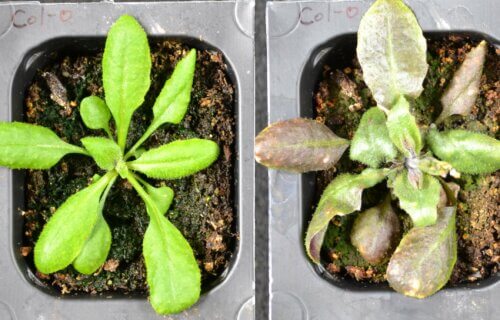RIVERSIDE, Calif. — Plants protect themselves from various environmental dangers (heat, pests, drought, etc) by producing salicylic acid, better known as aspirin among humans. That’s right, plants can make their own aspirin.
While that fact isn’t breaking news, new research from the University of California, Riverside reports a more comprehensive understanding of this process that may help plants survive increasing stress caused by climate change. Scientists analyzed how plants regulate the production of salicylic acid for this latest project.
More specifically, a model plant called Arabidopsis was studied. That being said, the research team wants to apply their findings regarding stress responses in this plant’s cells to numerous other plant varieties, including those grown for food. “We’d like to be able to use the gained knowledge to improve crop resistance,” says co-first study author Jin-Zheng Wang, UCR plant geneticist, in a statement.. “That will be crucial for the food supply in our increasingly hot, bright world.”
Across all living beings environmental stress sparks the formation of reactive oxygen species (ROS). For instance, if you go to the beach on a sunny day with no sunscreen, your skin will produce ROS, leading to freckles and sunburn. For plants specifically, too much ROS can prove deadly.
Of course, the difference between medicine and poison often comes down to dosage. At low levels, ROS serves an important function in plant cells. “At non-lethal levels, ROS are like an emergency call to action, enabling the production of protective hormones such as salicylic acid,” Wang explains. “ROS are a double-edged sword.”
The analysis revealed heat, unabated sunshine, and drought all cause the sugar-making apparatus within plant cells to generate an initial alarm molecule called MEcPP. Moving forward, the research team believes learning more about MEcPP, which is also produced in organisms such as bacteria and malaria parasites, is very important. MEcPP buildup in plants can trigger the production of salicylic acid, subsequently starting a chain of protective actions in the cells.
“It’s like plants use a painkiller for aches and pains, just like we do,” notes co-first study author Wilhelmina van de Ven, UCR plant biologist.
Salicylic acid protects plants’ chloroplasts, which are where photosynthesis occur.
“Because salicylic acid helps plants withstand stresses becoming more prevalent with climate change, being able to increase plants’ ability to produce it represents a step forward in challenging the impacts of climate change on everyday life,” comments senior study author Katayoon Dehesh, UCR distinguished professor of molecular biochemistry.
“Those impacts go beyond our food. Plants clean our air by sequestering carbon dioxide, offer us shade, and provide habitat for numerous animals. The benefits of boosting their survival are exponential,” she concludes.
The study is published in Science Advances.
